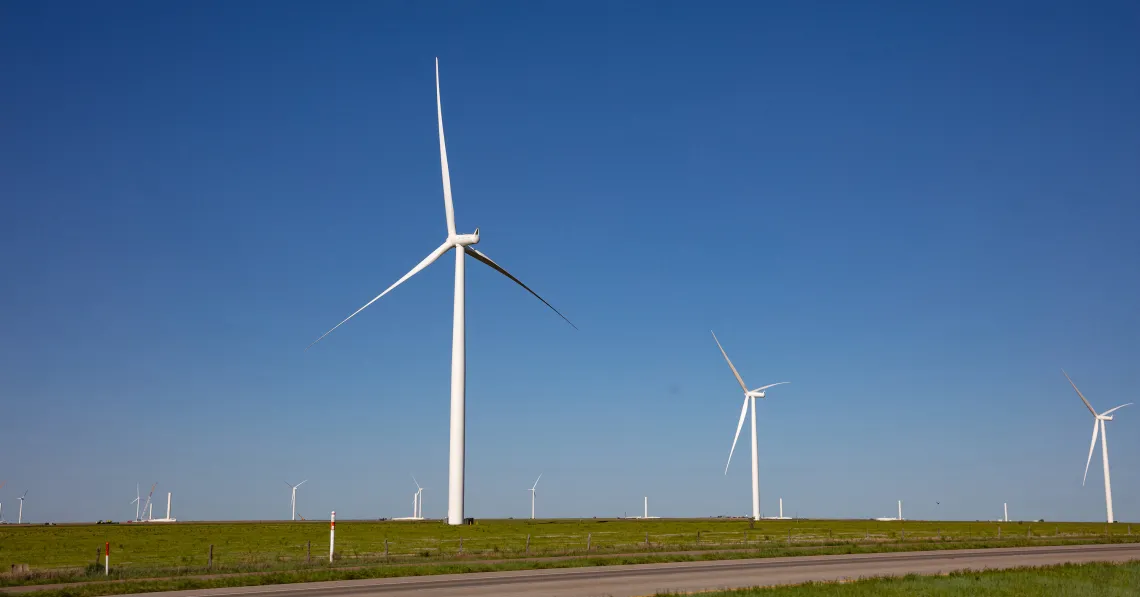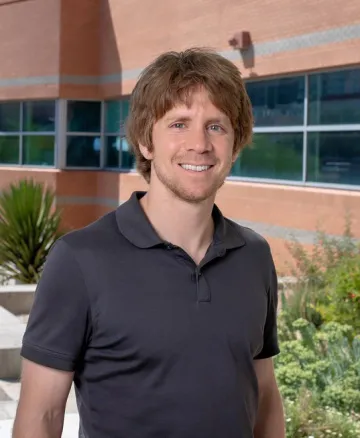Wind Power

On Earth Day, the University of Arizona announced that it is the largest research university in the country to offset the entirety of its Scope 2 emissions: the greenhouse gases that result from the generation of electricity, heat or steam purchased from a utility provider. Thanks to a 2019 partnership with Tucson Electric Power, UArizona now sources power from the 250-megawatt Oso Grande Wind Farm in New Mexico and the Wilmot Energy Center,
a new solar-and-storage facility located south of Tucson.
It’s a strategic plan priority and an action UArizona is taking as a member of the University Climate Change Coalition. The coalition, with 20 member universities in the United States, Canada and Mexico, is committed to reducing climate-changing emissions and improving research on climate change policy.

“Wind and solar are now cost competitive, and that is something that was not true 15 years ago,” says Derek Lemoine, associate professor of economics at UArizona’s Eller College of Management. “Solar, just in the last decade, has become as cheap as natural gas throughout the grid. It’s no longer a question of ‘How much money are you willing to lose on renewables?’ — it is cost competitive. And that’s been a complete game changer for the industry.”
Lemoine shares his perspective on climate change and policy.
Growing Insight
I grew up in rural Louisiana and always enjoyed spending time in nature, so the environment is a natural interest. While I was in grad school, I gravitated toward economics, because it offers a mathematical and logical way to address social problems and make concrete progress, but within a formal framework that I find intellectually stimulating and powerful.
Growing up, I didn’t learn about climate change. I went to high school in the ’90s, and it was not in our curriculum. I studied environmental topics in college and barely learned about it the entire way through; I don’t even know if I heard of it in college. It wasn’t until a couple years after college that I was reading a random book on climate change. And I remember thinking, “Whoa, if this is real, it is a big deal.”
In the Classroom
I’ve been teaching Econ 150 for eight or nine years. After introducing basic economic principles, I cover the basics of climate change before going into climate economics and policy solutions. I went in expecting some degree of pushback. I’m trying to be objective and neutral — really just providing information, not advocating one thing or another. I am astonished at students’ level of understanding and engagement around this issue. They’ve clearly had exposure to the basics of climate science. I’ve yet to have a student express a concern that we’re talking about this subject or about the way we’re talking about it. This is real to them — they will be living this.
Shifting Federal Policy
The thing about climate policy is not, “Where’s the policy this year?” If I’m deciding whether to build a coal plant, I’m thinking about policy over the next 30 years. There’s been a lot of policy whiplash, but climate change isn’t going away. It’s only becoming a more important issue over time, for many reasons that I think we all can see. Investors aren’t so short-term that they thought the previous administration’s policy was going to be the policy forever. People know that President Biden is constrained in what he can accomplish and know former President Trump was constrained in what he could undo. Things are going to swing back and forth over time. But whether it’s a four- or eight-year pendulum, the direction of travel is pretty clear.
On the Horizon
We’re going to run out of atmosphere before we run out of fossil fuels. Companies are not oblivious to this; many are planning around oil drawdowns and demand peaks — and whether demand has already peaked is debatable. The question is, do we ride this out? Or do we start shifting our business model toward post-oil? Some are shifting more toward carbon capture, trying to use carbon as a product as a way of avoiding it going into the atmosphere, or even taking it out of the atmosphere. Others are going to renewable energy or electric vehicles.
Toward Global Solutions
The really hard thing about climate change is the magnitude of the problem. In a sense, we all have to do a lot, but nothing that any one of us does really matters. There’s no corporation big enough to really, truly matter and be the director of climate change on its own. One approach would be a collective policy that rejiggered market incentives to actually make market prices reflect the true cost of emissions. We have a market economy because we think that prices capture values and costs, and people can then make the proper trade-offs for themselves.
Right now, there’s a huge cost that’s missing from the price of a lot of products. And so the market’s not really working. For instance, consider the generation of electricity. The cost of coal and natural gas reflects the cost of extracting them, but their true cost also includes their effects on the climate. Solar starts looking even more attractive if its competitors’ costs would reflect their true costs to society. Or consider driving: Pricing carbon can make electric vehicles more competitive with gasoline vehicles, but only if your electricity is cleaner than gasoline.
The goal, from an economist’s perspective, is to make the market work, which means that you need regulation of some sort to establish the correct price of carbon; we call that an externality, the carbon externality. You have to price that and add it into the cost of anything with carbon emissions. Without that, yeah, every individual action helps. But we’re not going to get to where we need to go purely through voluntary actions — we’re going to need a broader collective policy.
